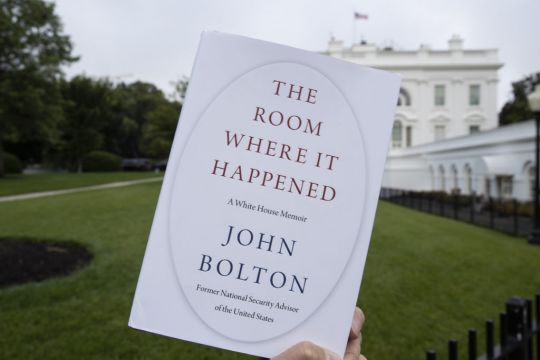The Justice Department on Wednesday abandoned its lawsuit against John Bolton, former President Donald Trump’s one-time national security adviser, over his book that officials argued disclosed classified information, according to court documents and Mr Bolton’s representatives.
Prosecutors also have dropped a grand jury investigation over the book’s publication, Bolton’s lawyer said on Wednesday.
The Trump administration sued last year to block the release of Bolton’s book, The Room Where It Happened, and to recover copies already distributed.
The book, released in the run-up to the 2020 presidential election, offered a behind-the-scenes and unflattering account of Mr Trump’s foreign policy dealings.

It described how Mr Trump asked China’s President Xi Jinping to help the American’s re-election prospects and how Mr Trump had pressured his Ukraine counterpart for politically charged investigations.
Justice Department lawyers who sued over the book had insisted the manuscript contained classified information that could damage national security and that Mr Bolton, a former US ambassador to the United Nations, had failed to complete a prepublication review process designed to prevent the disclosure of government secrets.
On Wednesday, the Biden administration filed a document in federal court dismissing the suit, formally bringing the year-long court fight to an end.
“These actions represent a complete vindication for Ambassador Bolton, and a repudiation of former President Trump’s attempt, under the pretext of protecting classified information, first to suppress the book’s publication and when that failed in court, to penalise the ambassador,” said Bolton spokeswoman Sarah Tinsley.
Mr Bolton’s lawyers say he moved forward with the book after a White House National Security Council official, with whom he had worked for months, had said the manuscript no longer contained classified information.

That official, Ellen Knight, described in a letter submitted to the court last September how Trump administration officials repeatedly exerted political pressure in an unsuccessful effort to block the book’s release. She described an unusual process of delay tactics and legal manoeuvrings.
Ms Knight, a career government records professional, said through her lawyer that after she had determined that the manuscript no longer contained classified information and was ready for clearance, she learned a political appointee with no experience in the prepublication review process had been assigned by the White House to conduct a new review.
That official subsequently flagged hundreds of passages in Mr Bolton’s manuscript that the official believed were still classified.
A federal judge last year rejected the Justice Department’s efforts to halt the book’s release, partly because hundreds of thousands of copies had already been distributed. But the judge expressed concern that Mr Bolton published the book before receiving a formal clearance letter, which Ms Knight said was blocked by the White House.
Besides suing Mr Bolton, the Justice Department opened a criminal investigation over the book, though that inquiry has now been dropped, Mr Bolton’s representatives said. A department spokesman declined to comment on Wednesday.







